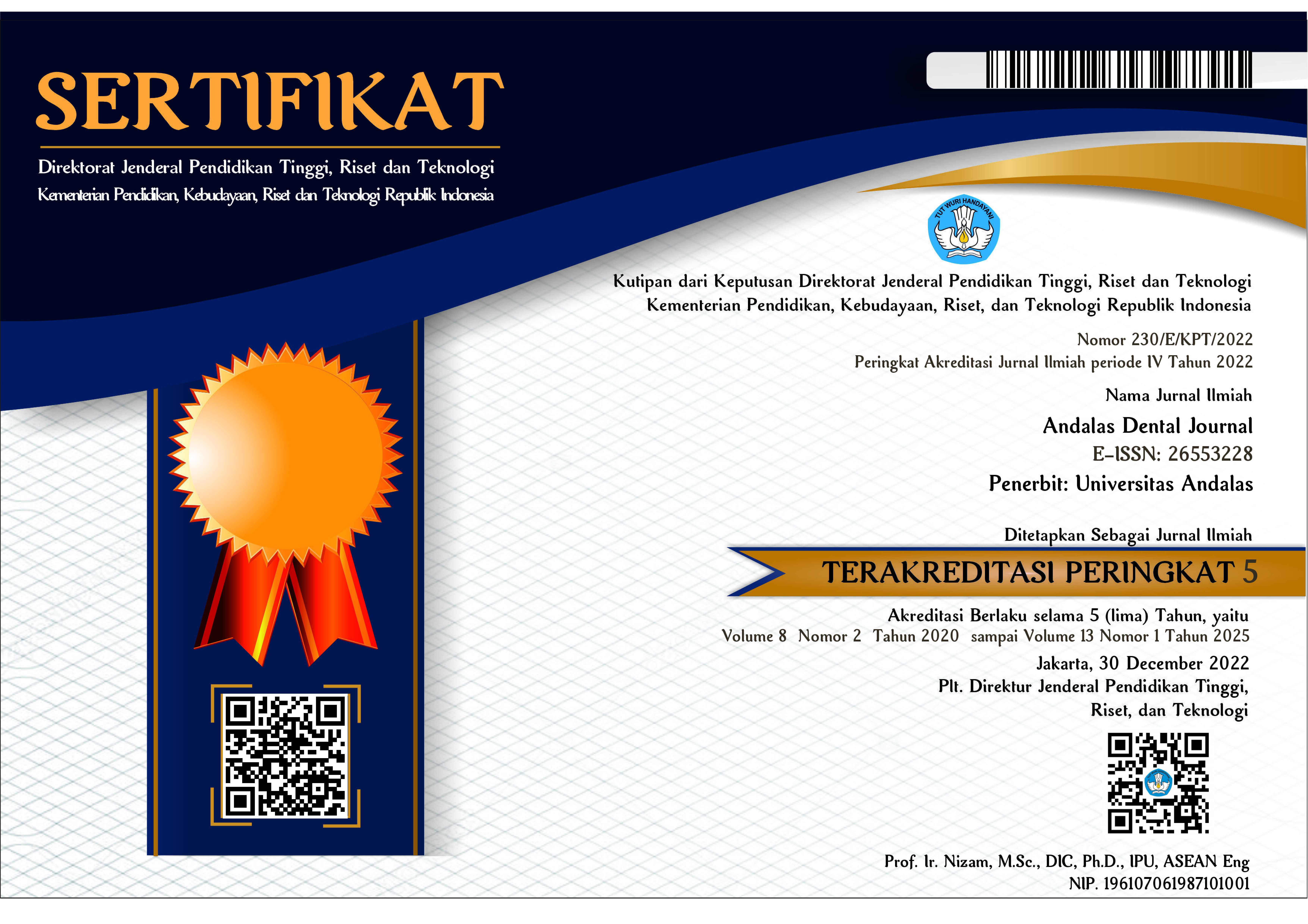Leeway Space Mandibula pada Siswa Suku Minang di Sekolah Dasar Lubuk Sikaping, Sumatera Barat
Abstract
The prediction of permanent size of theet which haven’t errupted to determine the value of place needed, availability of space and predict the storage of space. Is one of important aspect in diagnosis and treatment planning on the period of mixed dentition. Prediction method that used commonly is Moyers method which the data is taken from Kaukasoid ras. The objective of the research is to see the difference of leeway space of mandibula on Minang man and woman students of elemantary school Lubuk Sikaping. The method of this research is cross sectional comprative study. 56 samples of mandibula study are taken from the student of SDN 06 Pauh, SDN 09 Pauh, and SDN 10 Pauh Lubuk Sikaping at the age of 8 to 10 years and they are Minangnese. The results are analyzed statistically by t-test on significant degree 95%. This research indicates that the large average of man mandibula leeway space on the left (1,76 mm) and on the right (1,85 mm). And the average of leeway space of woman mandibula leeway space on the left (2,03 mm) and on the right (2,16 mm). The analyze t-test result on the significant degree 95% show there is no significant difference (p>0,05) between man and woman students. Therefore, it can be concluded that the large average of leeway space of man and woman mandibula in Minang students of elementary school Lubuk Sikaping showed no significant difference in size.
References
2. Heryumani. Metode perhitungan dalam perawatan ortodontik. Bagian ortodonsia FKG UGM; 2008.
3. Awaliyah Rizkiani Ramli. Validitas Indeks Moyers Di SDN 28 Tumampua Pangkajene [Makassar : Universitas Hassanudin; 2014.
4. Boboc Alin dan Jos Dibbet. Prediction of the mesiodistal width of unerupted permanent canines and premolars: A statistical approach. Marburg, Germany, and Sibiu, Romania; 2010.
5. Shaw, WC. Orthodontics and Occlusal Management.Oxford, UK: Butterworth-Heinemann Ltd; 1993. p. 55.
6. Meidy Gusti L, Fajar Kusuma D.K., Irnamanda D.H. Perbandingan rerata besaran leeway space suku banjar dengan rerata leeway space menurut Proffit:Odonto Dental Journal; 2016; Volume 3. Nomer 1.
7. Ulfa Maria. Prediksi Leeway Space Menggunakan Tabel Moyers Pada Pasien Yang Dirawat Di Klinik Ortodonsia FKG USU. Departemen Ortodonsia Fakultas Kedokteran Gigi Universitas Sumatera Utara [Medan; FKG USU; 2009.
8. Mathewson RJ, Primosch RE. Fundamentals of Pediatric Dentistry. 3ed. Quintessence Books. p. 31.
9. Bhalajhi SI. Orthodontics the art and science. 1st Ed. New Delhi : Arya (medi) publishing house; 1977. p.56-60.
10. Duterloo, H.S. An Atlas of Dentition in Chilhood. Wolfe Publishing Ltd. England; . 1991. p. 69-85
11. Basavaraj, SP. Orthodontics: Principles and Practice.New Delhi, India: JP Medical Ltd; 2011.pp. 65-7.
12. Singh G. Textbook of orthodontics. 2nded. New Delhi: Jaypee Brother Medical Publisher Ltd; . 2007.p. 37-48.
13. Rao, A. Principles and Practice of Pedodontics. 2nd edition. New Delhi, India: Jaypee Brothers Publisher; 2008. p. 70-6.
14. Phulari BS.Orthodontics principles and practice. 1sted. New Delhi: Jaypee brothers medical publishers; 2011; 74-5.
15. English JD, Peltomaki T, Pham-Litschel K. Orthodontic review. St. Louis: Mosby year book; 2010; 13-21.
16. Dasgupta B, Zahir S. Comparison of two non-radiographic techniques of mixed dentition space analysis and evaluation of their reliability for Bengali population. Contemp Clin Dentistry; 2012; 3(2); p.146-150.
17. Vyas MB, Hantodkar N. Resolving mandibular arch discrepancy through utilization of Leeway space: Contemporary Clinical Dentistry; 2011; 2(2) : 115-8.
18. Proffit WR, Field Jr HW, Sorver DM. Contemporary orthodontics [e-book].5th.ed.St.Louis(Messouri): Mosby; 2014.
19. Nafisah R, Syafei A, Goerharto S. Besar leeway space pada pasien ortodonti di RSGM FKG UNAIR. Orthodontic DentJ; 2010; 1(2):6-10.
20. Hille HM. The mean leeway space in a popuation of orthodontic patients in Zurich [Zurich: Universitat Zurich; 2010; p.1-23.
21. Laviana A. Analisis model studi sumber informasi penting bagi diagnosis ortodonti. Bagian Ortodonsi Fakultas Kedokteran Gigi Universitas Padjajaran. Bandung; 2011.
22. AI-Khandra Basil Hussain , BDS, MS. Prediction of the size of unerupted canines and premolars in a Saudi Arab population: Dhahran, Saudi Arabia; 1993.
23. Yohanna W. Perawatan ortodontik pada geligi campuran. Bagian Ilmu Kedokteran Gigi Anak Fakultas Kedokteran Gigi Universitas Padjajaran. Bandung; 2010.
24. Green-Thompson NF. Measuring and predicting using computer imaging analysis. Johannesburg: University of the Witwatersrand; 2007.
25. Moyers RE. Handbook of orthodontics. 4thed. Yearbook Medical Pub Inc Chicago; 1988; 235-8.
26. Hixon EH, Oldfather RE. Estimation of the sizes of unerupted cuspid and bicuspid teeth [Iowa: State University of Iowa; 1958; 236-240.
27. Irwin RD, Herold JS, Richardson A. Mixed dentition analysis: a review of methods and their accuracy. Int J Paediatr Dent; .1995; 5(3):137-4.
28. Green-Thompson NF. Measuring and predicting leeway space in mixed dentition on panoramic x-rays using computer imaging analysis. University of the Witwatersrand. Johannesburg; 2007.
29. Levelle CLB, Foster TD, Flinn RM.Dental arches in various ethnic groups. J Angle Orthod; 1971; 41(4): 293-9.
30. Irsa R, Syaifullah, Tjong DH. Variasi Kefalometri pada Beberapa Suku di Sumatera Barat Cephalometry variation of ethnics in West Sumatra. Padang: Universitas Andalas; 2013; 130-137.
31. Sutan AS. Perbandingan vaiditas analisis Tanaka-Johnston dan analisis Moyers pada mahasiswa suku Batak Universitas Sumatera Utara. [Medan: Universitas Sumatera Utara; 2013.p.1-24.
32. Megawaty. Prediksi Leeway space dengan menggunakan metode Tanaka-Johnston pada murid sekolah dasar ras deutro-melayu di kecamatan Medan Helvetia [Medan: Universitas Sumatera Utara; 2014.
33. Decland E Ward, Workman J, Brown R, Richmond S. Changes in arch width after treatment. Angle Orthod; 2006; 76(1): 6-13
34. Budiman JA, Yashadana EDD, Sadosa SD, Masbirin PI. 1997.Hubungan rasio anterior dengan overjet dan overbite pada perawatan ortodontik. Jurnal Kedokteran Gigi Universitas Indonesia; 2006; 4(3): 19-25
35. Alvesalo, L. The influence of sex-chromosome genes on tooth size in man. A genetic and quantitative study. Proc Finn Dent Soc; 1971; 67: 3–54.
36. Dewanto H. Aspek-Aspek Epidemiologi Maloklusi. Gajah Mada University Press; Yogyakarta; 1993.
37. Dempsey, P. J., Townsend. Genetic and environmental contributions to variation in human tooth size. Australia; 2000.
38. Sastroasmoro, Sudigdo. Dasar-Dasar Metodologi Penelitian Klinis. CV. Sagung Seto; Jakarta; 2011.
39. Notoatmodjo, Soekidjo. Metodologi Penelitian Kesehatan.Rineka Cipta: Jakarta; 2010.















